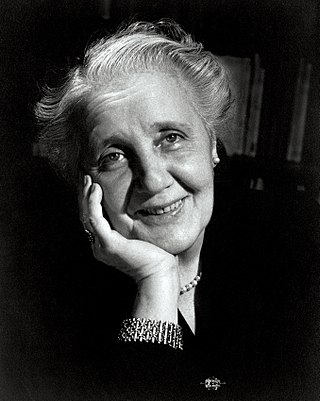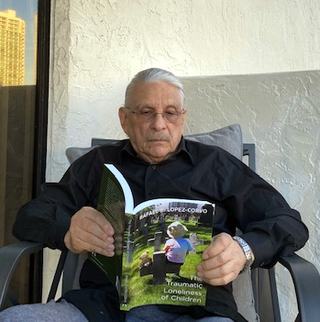
Wilfred Ruprecht Bion DSO was an influential English psychoanalyst, who became president of the British Psychoanalytical Society from 1962 to 1965.

Sándor Ferenczi was a Hungarian psychoanalyst, a key theorist of the psychoanalytic school and a close associate of Sigmund Freud.
Psychoanalytic theory is the theory of personality organization and the dynamics of personality development relating to the practice of psychoanalysis, a clinical method for treating psychopathology. First laid out by Sigmund Freud in the late 19th century, psychoanalytic theory has undergone many refinements since his work. The psychoanalytic theory came to full prominence in the last third of the twentieth century as part of the flow of critical discourse regarding psychological treatments after the 1960s, long after Freud's death in 1939. Freud had ceased his analysis of the brain and his physiological studies and shifted his focus to the study of the psyche, and on treatment using free association and the phenomena of transference. His study emphasized the recognition of childhood events that could influence the mental functioning of adults. His examination of the genetic and then the developmental aspects gave the psychoanalytic theory its characteristics. Starting with his publication of The Interpretation of Dreams in 1899, his theories began to gain prominence.

Melanie Klein was an Austrian-British author and psychoanalyst known for her work in child analysis. She was the primary figure in the development of object relations theory. Klein suggested that pre-verbal existential anxiety in infancy catalyzed the formation of the unconscious, which resulted in the unconscious splitting of the world into good and bad idealizations. In her theory, how the child resolves that split depends on the constitution of the child and the character of nurturing the child experiences. The quality of resolution can inform the presence, absence, and/or type of distresses a person experiences later in life.
Object relations theory is a school of thought in psychoanalytic theory and psychoanalysis centered around theories of stages of ego development. Its concerns include the relation of the psyche to others in childhood and the exploration of relationships between external people, as well as internal images and the relations found in them. Thinkers of the school maintain that the infant's relationship with the mother primarily determines the formation of its personality in adult life. Particularly, attachment is the bedrock of the development of the self or the psychic organization that creates the sense of identity.
Countertransference is defined as redirection of a psychotherapist's feelings toward a client – or, more generally, as a therapist's emotional entanglement with a client.
The British Psychoanalytical Society was founded by Ernest Jones as the London Psychoanalytical Society on 30 October 1913. It is one of two organisations in Britain training psychoanalysts, the other being the British Psychoanalytic Association.
In development psychology, Melanie Klein proposed a "(psychic) position theory" instead of a "(psychic) stage theory".
Projective identification is a term introduced by Melanie Klein and then widely adopted in psychoanalytic psychotherapy. Projective identification may be used as a type of defense, a means of communicating, a primitive form of relationship, or a route to psychological change; used for ridding the self of unwanted parts or for controlling the other's body and mind.
Donald Meltzer (1922–2004) was a Kleinian psychoanalyst whose teaching made him influential in many countries. He became known for making clinical headway with difficult childhood conditions such as autism, and also for his theoretical innovations and developments. His focus on the role of emotionality and aesthetics in promoting mental health has led to his being considered a key figure in the "post-Kleinian" movement associated with the psychoanalytic theory of thinking created by Wilfred Bion.

Rafael E. Lopez-Corvo is a Venezuelan-born medical doctor, psychiatrist and psychoanalyst. He is a former associate professor at Ottawa and McGill Universities and Program Director of Child and Adolescents Unite at the Douglas Hospital, McGill University in Montreal, Canada. He was also a member of the editorial board of the International Journal of Psycho-Analysis for Latin-America. Likewise, he is a training and supervising psychoanalyst for the International Psychoanalytic Association as well as the Canadian, Venezuelan and American Psychoanalytic Societies.

Joan Hodgson Riviere was a British psychoanalyst, who was both an early translator of Freud into English and an influential writer on her own account.
Hanna Segal was a British psychoanalyst of Polish descent and a follower of Melanie Klein. She was president of the British Psychoanalytical Society, vice-president of the International Psychoanalytical Association, and was appointed to the Freud Memorial Chair at University College, London (UCL) in 1987. The American psychoanalyst James Grotstein considered that "received wisdom suggests that she is the doyen of "classical" Kleinian thinking and technique." The BBC broadcaster Sue Lawley introduced her as "one of the most distinguished psychological theorists of our time,"
The term reparation was used by Melanie Klein (1921) to indicate a psychological process of making mental repairs to a damaged internal world. In object relations theory, it represents a key part of the movement from the paranoid-schizoid position to the depressive position — the pain of the latter helping to fuel the urge to reparation.
Neville Symington was a member of the Middle Group of British Psychoanalysts which argues that the primary motivation of the child is object-seeking rather than drive gratification. He published a number of books on psychoanalytic topics, and was President of the Australian Psychoanalytical Society from 1999 to 2002.
Martha Harris, née Dunlop was a British Kleinian psychoanalyst of children and adults. From 1960 to 1980 she was head of the Child Psychotherapy service at the Tavistock Clinic, taking over from Esther Bick, who had established a foundational method of disciplined infant observation. Harris was responsible for the subsequent expansion in the number of English and international trainees at the Tavistock, and for laterally developing the training into what became known as the Tavi Model. This model, in which infant observation continues to play a pre-eminent role, has been adopted, with modifications, in other European countries and in South America: such as the GERPEN in France, the six Martha Harris Study Centres in Italy, and the São Paulo Mother-Baby Study Centre in Brazil.
Paranoid anxiety is a term used in object relations theory, particularity in discussions about the Paranoid-schizoid and depressive positions. The term was frequently used by Melanie Klein, especially to refer to a pre-depressive and persecutory sense of anxiety characterised by the psychological splitting of objects.
James S. Grotstein was a psychiatrist and psychoanalyst, known for his role in the popularization and explication of the work of Melanie Klein and Wilfred Bion. Among other topics, he expanded on Klein's notions of the paranoid-schizoid and depressive positions. His roles in psychoanalytic organizations included serving as North American Vice President of the International Psychoanalytical Association (IPA), and on the editorial board of the International Journal of Psychoanalysis (IJP).
James Gooch was an American psychiatrist and psychoanalyst influential in promoting the ideas of Melanie Klein, Wilfred Bion, and the British Object Relations theorists in Southern California in the 1980s and 1990s. He was chair of the Department of Psychoanalysis at the California Graduate Institute, an independent professional school for psychologists, and during 1984-1990 he was founding president of the Psychoanalytic Center of California (PCC), a Kleinian-oriented psychoanalytic institute in Los Angeles. He was also a founding member of The Confederation of Independent Psychoanalytic Societies and served for eight years as the North American Representative to the Board of the IPA International Psychoanalytic Association.
Irma Brenman Pick was a South African-born British psychologist and psychoanalyst known for her work on countertransference. She served as the president of the British Psychoanalytical Society from 1997 to 2000.




